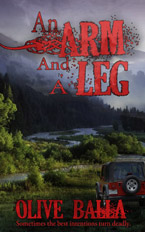by Olive Balla
 You’re over fifty, your kids are raised, your relationships are simple, you’ve learned most of life’s lessons firsthand, and now you want to write. Welcome. Welcome to the ranks of Late-Blooming Writers. As one of the aforementioned, I’ll share some of the bits and pieces of information gleaned along my path toward publication.
You’re over fifty, your kids are raised, your relationships are simple, you’ve learned most of life’s lessons firsthand, and now you want to write. Welcome. Welcome to the ranks of Late-Blooming Writers. As one of the aforementioned, I’ll share some of the bits and pieces of information gleaned along my path toward publication.
First, set a goal. Want to write meaningful poetry? Want to knock out a bestselling novel? Write down what you want to make happen. And then put it someplace where you’ll see it. Often. Next, stretch your brain-muscle. A good way to do that is to meditate. Thousands of pages of research indicate that meditating a few minutes a day will change the actual physical make-up of your brain. So will Sudoku, or jigsaw and crossword puzzles. And you’ll need to grow a tough skin. Not the kind that insulates you from the world, or squeezes the juice from your sensitivities. But the kind that allows the slings and arrows of rejection to roll harmlessly off as you do the trial and error thing to find your Writer’s Voice.
Then you’ll need to bone up on the basic rules of grammar and the elements of style. Strunk and White offers a small but priceless treasure trove of style tidbits. Besides learning the difference between showing and telling, you’ll need to use strong verbs, stay away from passive voice, and use few, if any, adjectives or adverbs. Oh, and you would be wise to eschew any iteration of the verb “to be.” You get the idea. Just as with any craft, you must first learn the rules, beginning with the basics.
Pitfall number one: Writer Entitlement. It’s an interesting but recurring phenomenon in wannabe writers, that their opinions about their own writing skills outshine the reality. I’ve read this in countless articles and blogs, so there must be something to it. We’ve always been told how well we write, so we figure our success is assured. However, none of us have been born with the Consummate Writer Gene already firmly installed. The kind of writing that gets published requires hard work and focused attention, followed by vigorous, time-consuming (often painful) revision.
Pitfall number two: Memoirs. Once you’ve generated dozens of chapters of the novel you can’t quite finish, after writing several essays and short stories, and once you’re absolutely certain you’ve reached the apex of writing competency, you’ll find yourself considering the possibility of writing your memoirs. Some would say it’s never too early to chronicle your life experiences. But unless your aim is to produce something solely for the historical value it might have to your family, it seems to me a better idea to put a memoir on hold—at least until after your first book is published. Although your life has doubtless resembled a roller coaster in its hairpin curves and surprising twists and turns, it’s tough to sell a memoir until someone, somewhere, knows your name. That is, unless you dated someone famous and decide to write a kiss-and-tell. Note: Just a suggestion, but if you want to write your memoirs as revenge for a lifetime of wrongs, you might consider finding a good attorney to cover your back. Libel suits can be expensive indulgences.
Pitfall number three: You believe the only-partially-true statement that all one has to do to achieve publication is to write. A lot. But the sad truth is it takes much more than cranking out ream upon ream of verbiage to make one’s way into the semi-rarified strata of published writer. Unless writers have occasion to be catapulted into the focus of the national news media, they must learn the ropes of the publishing industry, subscribe to various writers’ magazines and e-zines (or better yet, start one), join critique groups, build an extensive platform, and basically eat, drink and sleep writing. The key is to never stop learning and revising yourself.
Pitfall number four: You fear time is against you. Late bloomers often fall victim to this downward spiral of thought. You grow more and more impatient as the days, weeks, and months go by and your folder of rejections thickens. But hang in there. The process will not be hurried. Google writers who were published after the age of fifty and revel in the knowledge that you’re not alone.
The good news is that hundreds of books have been written on the subject of writing. Everything from workbooks to software is available. Pick one and get started. You’re on the ground floor, so there’s nowhere to go but up. Good luck. And as Tiny Tim said, “God bless us every one.”
 Olive Balla, author of suspense novel An Arm and a Leg, is mother of 3, grandmother to 13, great-grandmother of 4, a retired educator, and part-time professional musician. Having been everything from secretary at a used car dealership, a university student, and a high school Spanish teacher, Balla states her characters are, in part, amalgamations of people she’s met. Living with her husband Victor in the Albuquerque area, she spends her spare time in a small woodworking shop designing and building everything from breadboxes and wine racks, to a porch bench. Visit her website at: omballa.com.
Olive Balla, author of suspense novel An Arm and a Leg, is mother of 3, grandmother to 13, great-grandmother of 4, a retired educator, and part-time professional musician. Having been everything from secretary at a used car dealership, a university student, and a high school Spanish teacher, Balla states her characters are, in part, amalgamations of people she’s met. Living with her husband Victor in the Albuquerque area, she spends her spare time in a small woodworking shop designing and building everything from breadboxes and wine racks, to a porch bench. Visit her website at: omballa.com.
This article was originally published in the January 2013 issue of SouthWest Sage and is reprinted here by permission of the author.

























